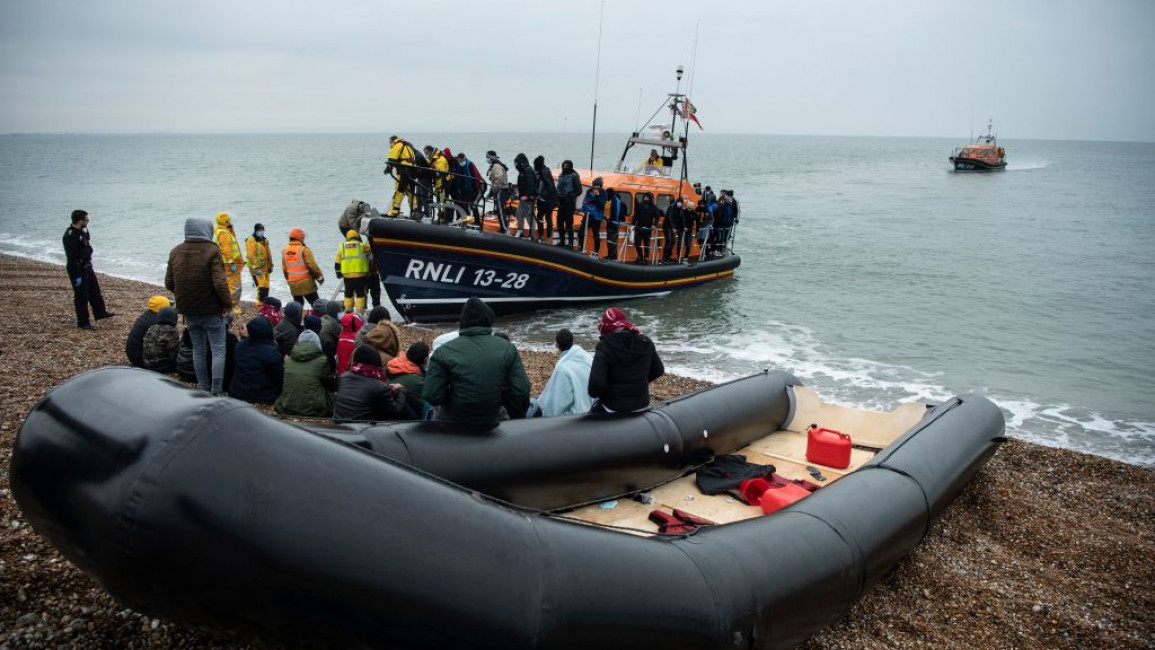UK, France agree to ‘step up’ efforts to prevent deadly Channel crossings
The UK and France have agreed to step up efforts to prevent dangerous journeys across the English Channel after at least 31 people were found dead off the northern port of Calais on Wednesday.
The two countries, engaged in tense squabbles in recent months about how best to reduce small boat crossings, said they will keep “all options on the table” to deter future perilous journeys, according to a UK government statement Wednesday.
British Prime Minister Boris Johnson and French President Emmanuel Macron blamed trafficking gangs for putting lives at risk and urged for greater cooperation with other European nations, such as Belgium and the Netherlands, in the statement.
However, political feuds did not disappear in the wake of the disaster, as Johnson pointed fingers at the French for causing “difficulties” and not handling the situation in the way it “deserves”.
Johnson and Macron “agreed on the urgency of stepping up joint efforts to prevent these deadly crossings and to do everything possible to stop the gangs responsible for putting people’s lives at risk,” said a UK government statement Wednesday.
Johnson said he was “shocked, appalled and deeply saddened” by the disaster, in which 17 men, 7 women and 3 minors died according to French authorities. Only two survivors were found, an Iraqi and Somali, who had extreme hypothermia.
Johnson added that Britain faced “difficulties persuading some of our partners, particularly the French, to do things in a way that the situation deserves”.
Our reaction to the tragedy in the Channel and our urgent call for government action https://t.co/aXw9anJjCw
— Refugee Council 🧡 (@refugeecouncil) November 25, 2021
For his part, Macron said that France would not allow the Channel to become a “cemetery”.
He called for an emergency meeting with EU ministers over the “migration challenge”. However, he did not accept a renewed offer from Johnson to allow British forces to patrol French beaches, according to British media reports.
Around 31,500 people have attempted to cross the Channel since the start of the year, according to French authorities.
A recent report by the UK charity Refugee Council found that the “majority” of men, women and children making the dangerous journey are in genuine need of protection. Many come to Britain to reunite with family members and are originally from war-torn areas in the Middle East, such as Iraq and Syria.
The Refugee Council and other British refugee organisations slammed the UK government over Wednesday’s disaster, saying the deaths were “both predictable and preventable”.
“This is a humanitarian disaster that should never have happened,” said Enver Solomon, CEO of the Refugee Council, to The New Arab.
“It’s incomprehensible that so many lives have been lost by people on a desperate and harrowing journey,” Solomon added.
Around ten other refugees have died while attempting the perilous crossing in recent weeks.
“Surely a tragedy of this magnitude is the wakeup call our Government needs to change its approach and finally commit to an expansion of safe routes for those men, women and children in desperate need of protection,”Solomon said.
The Refugee Council called on the UK government to reverse their current approach of “dehumanising” and penalising people who attempt the journey over the English Channel from France.
The UK governnment's National and Borders Bill, currently being debated in parliament, has been criticised for enshrining the "demonisation" of refugees into UK law, undermining people’s rights to claim asylum in the UK.
The Refugee Council said that the British government should instead create and expand safe routes for people arriving in the UK to claim asylum.
They called for an annual resettlement target of at least 10,000 and demanded a more “efficient and effective decision-making system” as around 98 percent of people crossing the Channel go on to claim asylum.


![Minnesota Tim Walz is working to court Muslim voters. [Getty]](/sites/default/files/styles/image_684x385/public/2169747529.jpeg?h=a5f2f23a&itok=b63Wif2V)




![Debris near Rafic Hariri International Airport [Getty]](/sites/default/files/styles/image_330x185/public/2176162423.jpeg?h=a5f2f23a&itok=MCSK9mkM)
![An Israeli air strike on Jabalia killed teenage journalist Hassan Hamad [Screengrab/X]](/sites/default/files/styles/image_212x120/public/2024-10/hassan%20hamad1.jpg?h=c12e0b96&itok=KstD_5xk)
